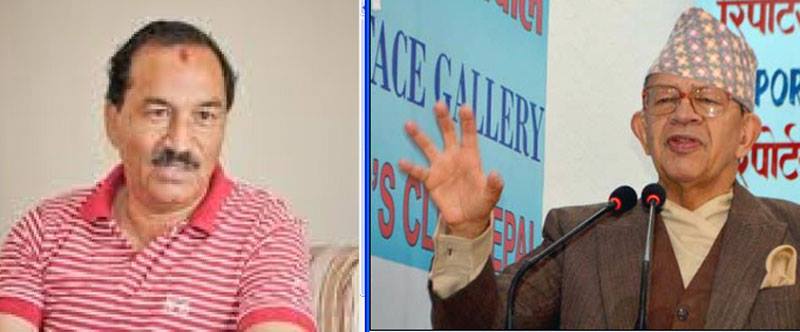
OR
News Analysis
RPP-N and RPP: A Strange unification
Published On: November 16, 2016 09:35 PM NPT By: Akhilesh Tripathi

KATHMANDU, Nov 16: A strange unification is going to take place between the Kamal Thapa-led Rastriya Prajatantra Party – Nepal (RPP-N) and the Pashupati Shumsher Rana-led Rastriya Prajatantra Party (RPP).
At a press conference organized in Bhaktapur today RPP Chairman Rana said the process of unifying the two parties will be completed in the next three months. Converting Nepal back into a Hindu State is the basis of the unification, he added.
Rana said the two parties have also agreed on the distribution of party posts after the unification. Then he made a confusing remark. “I will be the National Chairman of the Directive Committee and Kamal Thapa will be the Party Chairman who will implement the decisions of the Directive Committee.”
This is a unique arrangement. No other political party in the country has two chairmen!
The talk about unification between RPP and RPP-N has been doing rounds for quite a while now. Discussions aimed at unification between the two parties started more than 3-4 years ago. But they seemed to have got a concrete shape only recently. As a result, the announcement of the unification between the two parties was to be made on August 9. But the RPP joined the current government a day before.
“RPP joined the government in the eleventh hour of party unification, making the unification impossible,” roared Kamal Thapa, at a press conference in the capital on August 9, the fateful day when the two parties were supposed to unite.
RPP is still a partner in the incumbent Pushpa Kamal Dahal-led government. Deepak Bohara and Bikram Pandey from RPP are still government ministers. Many wonder what has made the unification possible then!
What is still unclear is the stance of the unified party on the issue of monarchy and federalism. Till date, RPP-N is against the idea of secularism, republicanism and federalism while RPP has already embraced the agendas of republicanism and federalism. Among these three agendas, which the RPP-N calls “sensitive issues”, the two parties have agreed upon only the agenda of secularism. Now both want to take secular Nepal back to the old days of a Hindu state. And this has become the basis of unification, according to Rana.
Does that mean the RPP-N has abandoned the agenda of reinstating the institution of monarchy and accepted federalism?
“No. We haven’t,” answers Mohan Shrestha, joint spokesperson for RPP-N. For the time being, the unification will take place. We will stand by our convictions and they will hold theirs. A general convention of the unified party to be held within the next three months will take the final call on the sensitive issues.”
This again gives rise to a few interesting questions. Is the RPP-N now tired of carrying the burden of monarchy? Will Kamal Thapa, who thinks that “sectarian and foreign powers are playing a divide and rule game in the country”, accept republicanism and federalism if the unified party’s general convention comes up with such decisions?
These questions make Shrestha a bit uncomfortable and annoyed. “We have calculated everything – our strength as well as theirs. I am confident that the general convention will endorse our agendas,” Shrestha told this scribe over the phone this evening.
But what if the general convention of the unified party decides against what Shrestha thinks? Then RPP-N will have to accept republicanism and federalism, wont it? “We will take a decision when such a situation comes,” Shrestha avoided a direct answer.
You May Like This

RPP and RPP Nepal merger soon: RPP chairman Rana
PANCHTHAR, Nov 10: Rastriya Prajatantra Party (RPP) chairman Pashupati Shamser Rana has said his party and the Rastriya Prajatantra Party... Read More...

Chand faction leaders on signature campaign for RPP, RPP-N unification
KATHMANDU, Aug 23: Around 46 central leaders of Rastriya Prajatantra Party (RPP) including former Prime Minister Lokendra Bahadur Chand are... Read More...

RPP-N, RPP announce unification
KATHMANDU, July 11: Rastriya Prajatantra Party-Nepal (RPP-N) led by Kamal Thapa and Rastriya Prajatantra Party (RPP) led by Lokendra Bahadhur... Read More...

Just In
- World Malaria Day: Foreign returnees more susceptible to the vector-borne disease
- MoEST seeks EC’s help in identifying teachers linked to political parties
- 70 community and national forests affected by fire in Parbat till Wednesday
- NEPSE loses 3.24 points, while daily turnover inclines to Rs 2.36 billion
- Pak Embassy awards scholarships to 180 Nepali students
- President Paudel approves mobilization of army personnel for by-elections security
- Bhajang and Ilam by-elections: 69 polling stations classified as ‘highly sensitive’
- Karnali CM Kandel secures vote of confidence


















Leave A Comment